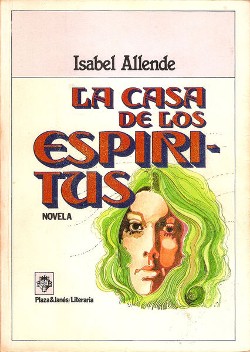
Eliza Rosanna Gilbert, Countess of Landsfeld, better known by the stage name Lola Montez, was an Irish dancer and actress who became famous as a Spanish dancer, courtesan, and mistress of King Ludwig I of Bavaria, who made her Gräfin von Landsfeld. At the start of the Revolutions of 1848 in the German states, she was forced to flee. She proceeded to the United States via Austria, Switzerland, France and London, to return to her work as an entertainer and lecturer.

Isabel Angélica Allende Llona is a Chilean-American writer. Allende, whose works sometimes contain aspects of the genre magical realism, is known for novels such as The House of the Spirits and City of the Beasts, which have been commercially successful. Allende has been called "the world's most widely read Spanish-language author." In 2004, Allende was inducted into the American Academy of Arts and Letters, and in 2010, she received Chile's National Literature Prize. President Barack Obama awarded her the 2014 Presidential Medal of Freedom.

The House of the Spirits is a 1993 period drama film directed by Bille August and starring Jeremy Irons, Meryl Streep, Glenn Close, Winona Ryder, Antonio Banderas and Vanessa Redgrave. The supporting cast includes María Conchita Alonso, Armin Mueller-Stahl, and Jan Niklas. Based on the 1982 novel of the same name by Isabel Allende, the film follows three generations of women from a Chilean family during the country’s military dictatorship.

The House of the Spirits is the debut novel of Isabel Allende. The novel was rejected by several Spanish-language publishers before being published in Barcelona in 1982. It became an instant best-seller, was critically acclaimed, and catapulted Allende to literary stardom. The novel was named Best Novel of the Year in Chile in 1982, and Allende received the country's Panorama Literario award. The House of the Spirits has been translated into over 20 languages.

María Isabel Allende Bussi is a Chilean politician and the youngest daughter of former Chilean president Salvador Allende Gossens.

Jorge Isaacs Ferrer was a Colombian writer, politician and soldier. His only novel, María, became one of the most notable works of the Romantic movement in Spanish-language literature.

Daughter of Fortune is a novel by Isabel Allende, and was chosen as an Oprah's Book Club selection in February 2000. It was published first in Spanish by Plaza & Janés in 1998. Isabel Allende says "of her female protagonist in Daughter of Fortune, Eliza, that she might well represent who the author might have been in another life." "Allende spent seven years of research on this, her fifth novel, which she says is a story of a young woman's search for self-knowledge." "Allende also believes that the novel reflects her own struggle to define the role of feminism in her life." Allende also wrote a sequel to Daughter of Fortune entitled Portrait in Sepia which follows Eliza Sommers' granddaughter.

Hildegart Rodríguez Carballeira was an activist for socialism and sexual revolution who was conceived and raised by her anti-theist, socialist, eugenicist, and feminist mother, Aurora Rodríguez Carballeira, as a prototype for the women of the future. She spoke four languages when she was eight years old, finished law school as a teenager, and was a leader of the Spanish Socialist Workers' Party (PSOE) which she abandoned in favor of extreme Republicanism, joining the Federal Democratic Republican Party (PRDF).. Her ideology became more critical of marxism, and she found more alignment with anarchist thought.

In the Chilote folklore and Chilote mythology of Chiloé Island in southern Chile, the imbunche is a legendary monster that protects the entrance to a warlock's cave.

Zoila Aurora Cáceres Moreno (1877–1958) was a writer associated with the literary movement known as modernismo. This European-based daughter of a Peruvian president wrote novels, essays, travel literature and a biography of her husband, the Guatemalan novelist Enrique Gómez Carrillo.

Mundo de fieras is a Mexican telenovela produced by Salvador Mejía Alejandre for Televisa that premiered on July 31, 2006, and ended on January 19, 2007. It is a remake of the Venezuelan telenovela Mundo de fieras, produced in 1991. The telenovela stars César Évora, Gaby Espino, Edith González, Ernesto Laguardia, Helena Rojo and Michelle Vieth.

Héroes is a Chilean TV miniseries produced by Canal 13 in 2007.

Bituin is a Philippine television drama series broadcast by ABS-CBN. Starring Carol Banawa, Desiree del Valle, Nora Aunor and Cherie Gil. It aired on the network's Teleserye Primetime Bida line up from September 23, 2002 to May 23, 2003, replacing Pangako Sa 'Yo and was replaced by Basta't Kasama Kita.

Amarte es mi pecado is a Mexican telenovela produced by Ernesto Alonso for Televisa in 2004.

Beatriz Patricia Ximena Allende Bussi, also known as Tati Allende, was a Chilean Socialist politician and surgeon. She was the daughter of former president of Chile Salvador Allende and his wife, Hortensia Bussi.

Marisol is a Mexican telenovela produced by Juan Osorio for Televisa in 1996. Telenovela is a remake of the 1977 Mexican telenovela Marcha nupcial. Famous and beloved Enrique Álvarez Félix died after he finished his work in Marisol.
El secreto de Puente Viejo was a Spanish soap opera produced by Boomerang TV that originally aired from 23 February 2011 to 20 May 2020 on Antena 3.

Inés of My Soul is a historical novel by the Chilean author, Isabel Allende. The novel consists of an elderly Inés Suárez writing a memoir of her own life. She narrates about her relationship with Pedro de Valdivia and the obstacles they had to overcome to conquer Chile and found the City of Santiago.

Violeta is a 2022 novel by Chilean-American author Isabel Allende. It is a fictional autobiographical account of the life of Violeta Del Valle and how she witnessed the various upheavals of the 20th century. Violeta in the book recalls all she has seen and experienced in an unnamed South American country spanning 100 years.

Severo Melgarejo Rojas was a Bolivian military officer, business man and guano magnate. He was the son of the President of Bolivia, Mariano Melgarejo, and his wife Rosa Rojas. He was considered a traitor by most Bolivians of his day due to his Chilean citizenship.



















